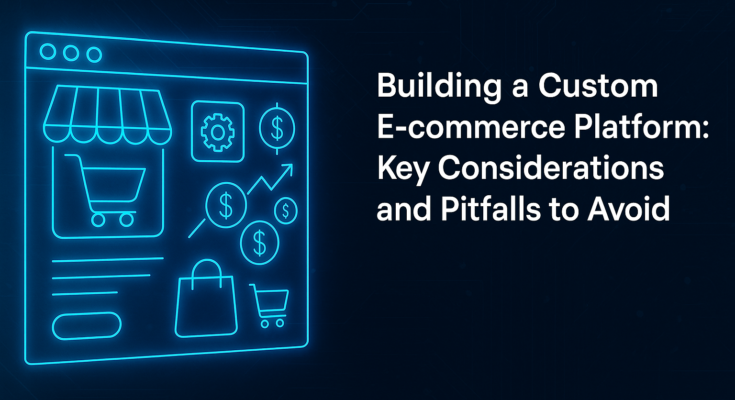The digital marketplace is more competitive than ever. With thousands of online stores launching daily, standing out requires more than great products. It demands a seamless, scalable, and fully tailored shopping experience. While off-the-shelf platforms like Shopify or WooCommerce serve many startups well, they often fall short regarding customization, growth, and complex integration needs.
This is where Zchwantech custom development plays a pivotal role, empowering businesses to build robust, personalized e-commerce platforms from the ground up. However, before diving into development, it is essential to understand the key considerations and potential pitfalls that can determine the success or failure of your project.
Why Choose a Custom E-commerce Platform?
Flexibility to Scale and Adapt
Every business is unique, so settling for a generic solution may limit growth and performance. A custom e-commerce platform enables companies to design workflows, features, and user experiences that align precisely with their operations and customer needs. This flexibility ensures the platform evolves alongside the business, supporting long-term scalability and success.
Full Control Over User Experience
With custom development, you are not limited by pre-designed templates. You have the freedom to create a unique UI and UX that reflects your brand identity, boosts conversion rates, and enhances customer satisfaction. Whether it involves advanced filtering, dynamic product pages, or interactive content, the possibilities are virtually limitless.
Seamless Integration with Internal Systems
Unlike boxed platforms, custom solutions can easily integrate with your ERP, CRM, warehouse management software, payment gateways, or third-party tools. This reduces manual processes and boosts operational efficiency.
Key Considerations Before Development Begins
Define Clear Business Objectives
Before a single line of code is written, align your team around what success looks like. Are you focused on boosting online sales, streamlining order fulfillment, or improving customer retention? Your goals will shape every design and development decision.
Choose the Right Tech Stack
Selecting the right front-end framework, such as React or Vue.js, back-end technology like Node.js, Laravel, or Django, and a suitable database such as PostgreSQL, MongoDB, or MySQL has a direct impact on performance, scalability, development speed, and long-term maintenance. Zchwantech works closely with businesses to assess their specific requirements and recommend technologies that align with their budget, timeline, and future growth objectives.
Plan for Payment and Shipping Logistics
Whether you’re integrating Stripe, PayPal, Razorpay, or local bank APIs, payment setup needs to be secure and smooth. Likewise, real-time shipping rates, tracking, and returns must be factored in early to prevent rework later.
Mobile-First and Performance-Focused
Over 70% of online purchases now happen on mobile devices. A modern e-commerce platform must be mobile-responsive, lightweight, and optimized for speed across all screen sizes.
Prioritize Security and Compliance
Custom platforms must comply with PCI-DSS (for payments), GDPR (for user data), and other region-specific regulations. Implementing SSL, data encryption, two-factor authentication, and secure admin roles is essential.
Common Pitfalls in Custom E-commerce Development
Underestimating Scope and Timeline
One of the most common mistakes is failing to properly estimate the complexity of building a custom solution. Features like product recommendations, inventory syncing, or customer loyalty systems often require deep planning and testing.
Poor UX/UI and Lack of Usability Testing
Even powerful platforms can fail if users get confused or frustrated. Avoid cluttered layouts, unclear navigation, or multi-step checkouts. Always include usability testing before launch.
Overengineering Features
It’s tempting to build everything at once, but doing so often leads to scope creep and project delays. A better approach is to focus on developing a Minimum Viable Product (MVP) that includes only the essential features, then improve and expand it based on real user feedback.
Ignoring SEO and Performance
Search engine visibility is still critical. Ensure clean URLs, fast page loads, optimized images, and schema markup are part of the development plan from day one.
No Long-Term Support Plan
A custom platform is a long-term commitment. Without a maintenance and update plan, even the most sophisticated site can become outdated or vulnerable.
How Zchwantech Custom Development Solves These Challenges
Zchwantech custom development helps businesses avoid these common traps by offering a structured, transparent, and collaborative development process.
Discovery to Deployment End-to-End Planning
Every project begins with in-depth research and stakeholder interviews. Zchwantech outlines clear milestones, deadlines, and deliverables to ensure alignment before coding starts.
Agile and Collaborative Approach
Using agile sprints, the team delivers functional features in short cycles. This keeps clients involved and allows for real-time adjustments based on evolving needs.
UX-Driven Design Philosophy
Zchwantech emphasizes UI/UX best practices, ensuring a clean, intuitive design that works across all devices. Every page is tested with real users to eliminate friction points.
Scalable and API-First Architecture
Modern e-commerce requires modular, flexible platforms. Zchwantech builds API-first systems that can connect with third-party services or grow into full omnichannel ecosystems.
Ongoing Support and Security
From regular backups to real-time monitoring and patches, Zchwantech provides full post-launch support to ensure your platform stays secure, fast, and bug-free.
Features That Drive Custom E-commerce Success
Custom platforms open the door to advanced features, such as:
- Personalized product recommendations based on AI or past purchases
- Advanced search and filtering to improve product discovery
- Scalable inventory management with bulk uploads and automated syncing
- Multi-currency and multi-language support for international customers
- Integrated analytics dashboards to monitor sales, behavior, and conversion
These capabilities offer a serious edge in today’s fast-moving digital commerce landscape.
Real-World Use Case: Zchwantech in Action
Client: A mid-sized apparel brand targeting Southeast Asia
Challenge: Outgrew its Shopify store due to limited customization and high transaction fees
Zchwantech Solution: Built a fully custom headless e-commerce platform with localized checkout flows, multilingual support, and seamless ERP integration
Results:
- 40% increase in mobile conversion rates
- 30% drop in cart abandonment
- 50% reduction in manual order processing time
This is just one example of how Zchwantech custom development empowers brands to break free from limitations and scale effectively.
Build Smarter, Sell Better
Building a custom e-commerce platform is not the right path for every business, but for those focused on long-term growth, it is often the smartest investment. The key is to begin with a clear strategy, assemble the right team, and follow a phased approach that allows the platform to evolve over time.
With a proven track record and deep technical expertise, Zchwantech Custom Development offers everything needed to bring your vision to life with security, efficiency, and a design that truly represents your brand.
Ready to Build an E-commerce Platform That Grows With You?
Skip the one-size-fits-all solutions. Whether you’re scaling an existing business or launching a new digital venture, Zchwantech is ready to help you build something that truly fits.
Ready to unlock your tech potential? Contact Zchwantech for a free consultation, and let’s discuss how we can be your partner in success. Email us at sales@zchwantech.com to learn more.




